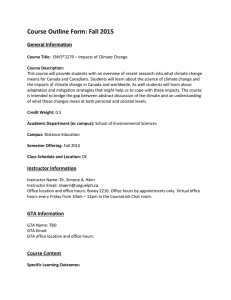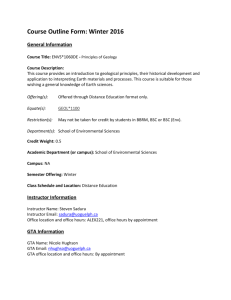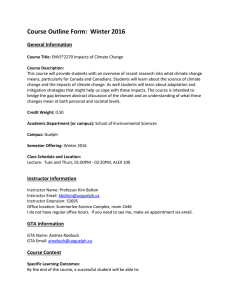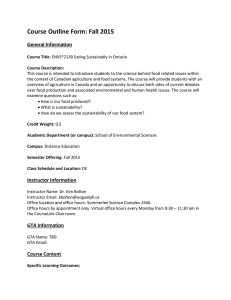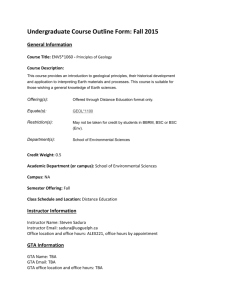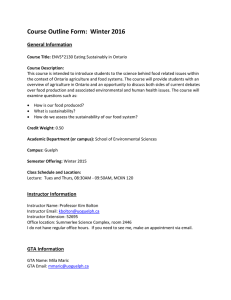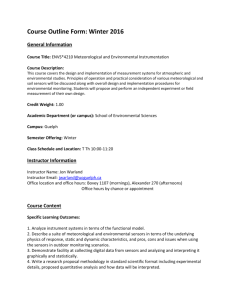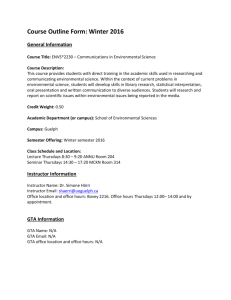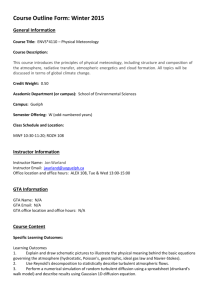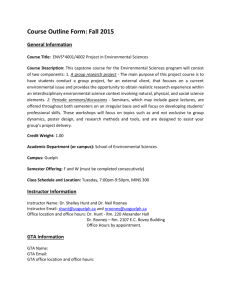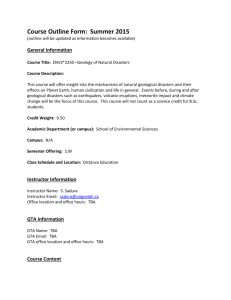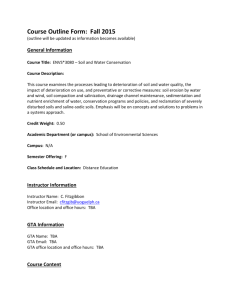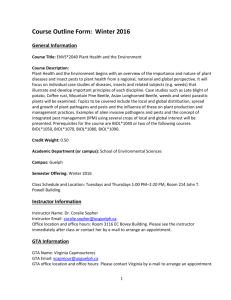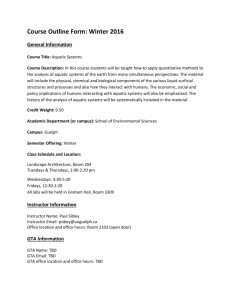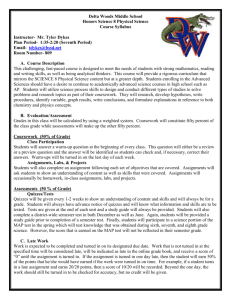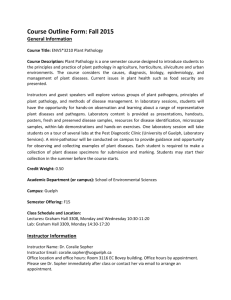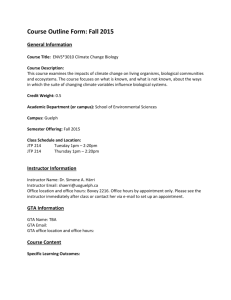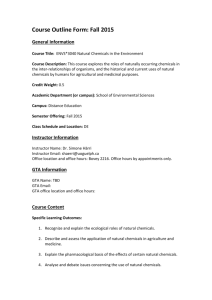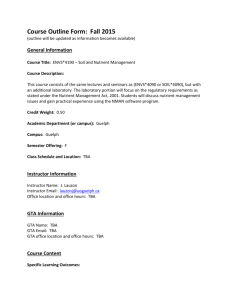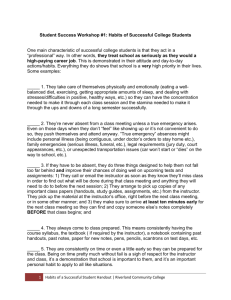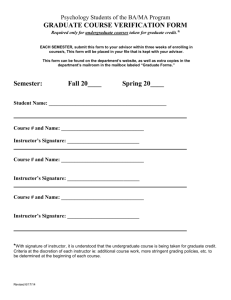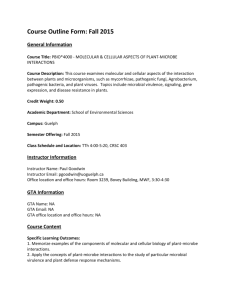ENVS*2320 Current Issues in Microbial & Molecular Science
advertisement
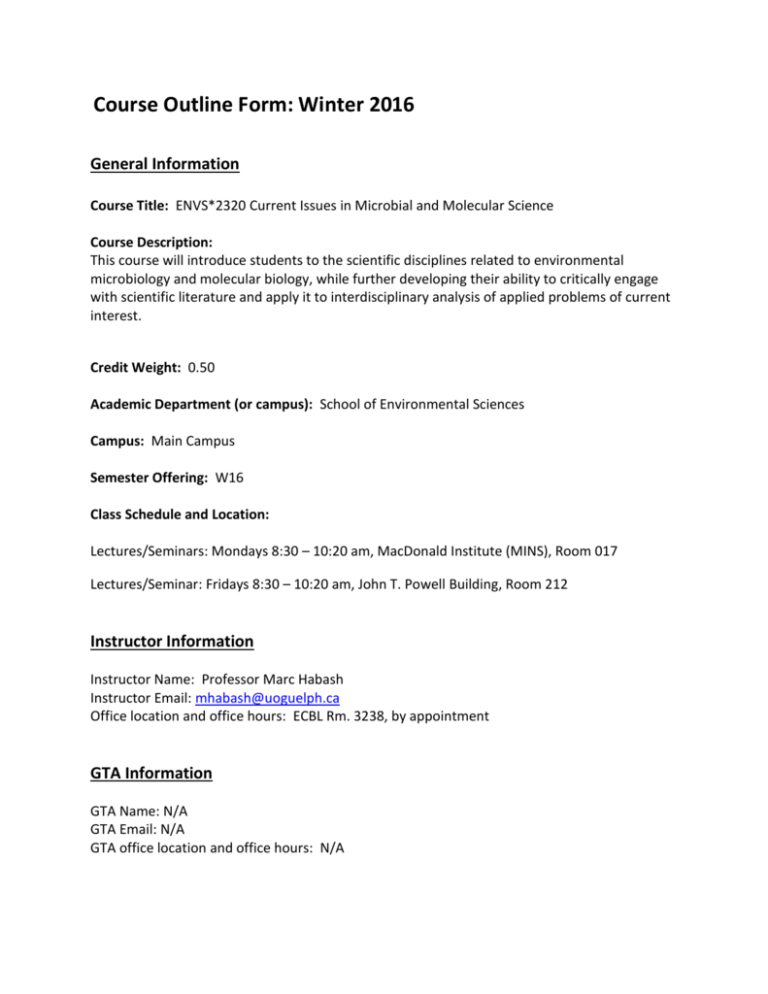
Course Outline Form: Winter 2016 General Information Course Title: ENVS*2320 Current Issues in Microbial and Molecular Science Course Description: This course will introduce students to the scientific disciplines related to environmental microbiology and molecular biology, while further developing their ability to critically engage with scientific literature and apply it to interdisciplinary analysis of applied problems of current interest. Credit Weight: 0.50 Academic Department (or campus): School of Environmental Sciences Campus: Main Campus Semester Offering: W16 Class Schedule and Location: Lectures/Seminars: Mondays 8:30 – 10:20 am, MacDonald Institute (MINS), Room 017 Lectures/Seminar: Fridays 8:30 – 10:20 am, John T. Powell Building, Room 212 Instructor Information Instructor Name: Professor Marc Habash Instructor Email: mhabash@uoguelph.ca Office location and office hours: ECBL Rm. 3238, by appointment GTA Information GTA Name: N/A GTA Email: N/A GTA office location and office hours: N/A Course Content Specific Learning Outcomes: At the end of this course successful students will be able to: 1. Describe environmental microbiology within the context of evolution, cell structure and function, cellular metabolic pathways, information flow and genetics, and microbial systems 2. Describe one or more current issues relating to environmental microbiology and molecular biology 3. Understand what information can be found in sections of a typical research article and to analyze and interpret this information efficiently 4. Create written and oral works investigating a current issue in environmental microbiology or molecular biology through critical assessment of current research Lecture Content: Lectures will integrate discussions of current issues in environmental microbiology and molecular biology by highlighting the following fundamental concepts: Evolution Microbial Systems Cell structure and function Metabolic pathways Information flow and genetics Impact of microorganisms on different environments Guest Lectures – Current research in environmental microbiology and molecular biology (various topics) Labs: Not applicable Seminars: The focus of the seminars will be to integrate in-class exercises to help reinforce lecture materials. These exercises will include: Student presentations (2 mini presentations and 1 longer presentation) Exercises to understand what information can be found in sections of a typical research article in order to assess them more efficiently Discussions of selected journal articles Course Assignments and Tests: Assignment or Test Due Date Mini presentations (2) Paper discussion Jan. 29, Feb. 26 One of: Feb. 5, 12, Mar 4, 11, or 18 Feb. 5, 12, Mar 4, 11, or 18 Mar. 11 April 1, 4 or 8 April 22 Participation – paper discussions Outline Presentation Final exam Contribution to Final Mark (%) 15 (2 X 7.5%) 10 Learning Outcomes Assessed 1, 3, 4 1, 2, 3, 4 10 (4x2.5%) 3, 4 15 20 30 1, 2, 3, 4 1, 2, 3, 4 1, 2, 4 Additional Notes (if required): Information for each assignment will be made available to students on Courselink. In this course, your instructor will be using Turnitin, integrated with the CourseLink Dropbox tool, to detect possible plagiarism, unauthorized collaboration or copying as part of the ongoing efforts to maintain academic integrity at the University of Guelph. All submitted assignments will be included as source documents in the Turnitin.com reference database solely for the purpose of detecting plagiarism of such papers. Use of the Turnitin.com service is subject to the Usage Policy posted on the Turnitin.com site. A major benefit of using Turnitin is that students will be able to educate and empower themselves in preventing academic misconduct. In this course, you may screen your own assignments through Turnitin as many times as you wish before the due date. You will be able to see and print reports that show you exactly where you have properly and improperly referenced the outside sources and materials in your assignment. Final examination date and time: April 22 (11:30 am – 1:30 pm) Final exam weighting: 30 Course Resources Required Texts: There is no required text. Journal articles, book chapters, and/or case studies needed for the course will be made available to students in class, via Courselink, or at the Library Reference Desk. Recommended Texts: Not applicable Lab Manual: Not applicable Course Policies Grading Policies: Due dates are final for all assignments. However, extensions may be granted in exceptional cases. Please contact the instructor as soon as possible to discuss a possible accommodation. Course Policy on Group Work: The following assignments will be prepared and submitted as groups: Research paper discussions Outline Presentation Group members will be assigned the same grade for these assignments. For each assignment, a distribution of effort (DOE) by each group member will need to be submitted. These may be used by the instructor to adjust the grade of individual group members where the DOE between group members is not balanced. Course Policy regarding use of electronic devices and recording of lectures: Electronic recording of classes is expressly forbidden without consent of the instructor. When recordings are permitted they are solely for the use of the authorized student and may not be reproduced, or transmitted to others, without the express written consent of the instructor. University Policies Academic Consideration: The University of Guelph is committed to supporting students in their learning experiences and responding to their individual needs and is aware that a variety of situations or events beyond the student's control may affect academic performance. Support is provided to accommodate academic needs in the face of personal difficulties or unforeseen events in the form of Academic Consideration. Information on regulations and procedures for Academic Consideration, Appeals and Petitions, including categories, grounds, timelines and appeals can be found in Section VIII (Undergraduate Degree Regulations and Procedures) of the Undergraduate Calendar. Academic Misconduct: The University of Guelph is committed to upholding the highest standards of academic integrity and it is the responsibility of all members of the University community, faculty, staff, and students to be aware of what constitutes academic misconduct and to do as much as possible to prevent academic offences from occurring. University of Guelph students have the responsibility of abiding by the University's policy on academic misconduct regardless of their location of study; faculty, staff and students have the responsibility of supporting an environment that discourages misconduct. Students need to remain aware that instructors have access to and the right to use electronic and other means of detection. Please note: Whether or not a student intended to commit academic misconduct is not relevant for a finding of guilt. Hurried or careless submission of assignments does not excuse students from responsibility for verifying the academic integrity of their work before submitting it. Students who are in any doubt as to whether an action on their part could be construed as an academic offence should consult with a faculty member or faculty advisor. Detailed information regarding the Academic Misconduct policy is available in Section VIII (Undergraduate Degree Regulations and Procedures) of the Undergraduate Calendar. Accessibility: The University of Guelph is committed to creating a barrier-free environment. Providing services for students is a shared responsibility among students, faculty and administrators. This relationship is based on respect of individual rights, the dignity of the individual and the University community's shared commitment to an open and supportive learning environment. Students requiring service or accommodation, whether due to an identified, ongoing disability or a short-term disability should contact the Student Accessibility Services (SAS), formerly Centre for Students with Disabilities (CSD), as soon as possible. For more information, contact SAS at 519-824-4120 ext. 56208 or email sas@uoguelph.ca or visit the Student Accessibility Services website (http://www.uoguelph.ca/csd/). Course Evaluation Information: End of semester course and instructor evaluations provide students the opportunity to have their comments and opinions used as an important component in the Faculty Tenure and Promotion process, and as valuable feedback to help instructors enhance the quality of their teaching effectiveness and course delivery. While many course evaluations are conducted in class others are now conducted online. Please refer to the Course and Instructor Evaluation Website for more information. Drop period: The drop period for single semester courses starts at the beginning of the add period and extends to the Fortieth (40th) class day of the current semester (the last date to drop a single semester courses without academic penalty) which is listed in Section III (Schedule of Dates) of the Undergraduate Calendar. The drop period for two semester courses starts at the beginning of the add period in the first semester and extends to the last day of the add period in the second semester. Information about Dropping Courses can be found in Section VIII (Undergraduate Degree Regulations and Procedures) of the Undergraduate Calendar. Additional Course Information None
